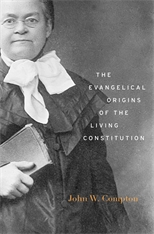The Evangelical Origins of the Living Constitution

The Evangelical Origins of the Living Constitution
John W. Compton
Harvard University Press 2014
The New Deal is often said to represent a sea change in American constitutional history, overturning a century of precedent to permit an expanded federal government, increased regulation of the economy, and eroded property protections. John Compton offers a surprising revision of this familiar narrative, showing that nineteenth-century evangelical Protestants, not New Deal reformers, paved the way for the most important constitutional developments of the twentieth century.
Following the great religious revivals of the early 1800s, American evangelicals embarked on a crusade to eradicate immorality from national life by destroying the property that made it possible. Their cause represented a direct challenge to founding-era legal protections of sinful practices such as slavery, lottery gambling, and buying and selling liquor. Although evangelicals urged the judiciary to bend the rules of constitutional adjudication on behalf of moral reform, antebellum judges usually resisted their overtures. But after the Civil War, American jurists increasingly acquiesced in the destruction of property on moral grounds.
In the early twentieth century, Oliver Wendell Holmes and other critics of laissez-faire constitutionalism used the judiciary’s acceptance of evangelical moral values to demonstrate that conceptions of property rights and federalism were fluid, socially constructed, and subject to modification by democratic majorities. The result was a progressive constitutional regime—rooted in evangelical Protestantism—that would hold sway for the rest of the twentieth century.
About the author:
John W. Compton is Assistant Professor of Political Science at Chapman University.
Reviews:
“John Compton’s superb book provides a fascinating account of the influence that evangelical attempts to stamp out drinking and lotteries had on American constitutional development. That, in itself, is worth the price of admission.”—Mark Graber, University of Maryland Francis King Carey School of Law
“The book’s clear, forcibly argued, and original thesis challenges some of the most influential scholarship in its field.”—Ken I. Kersch, Boston College
“As scholars and pundits debate whether the New Deal order is coming to an end, questions about its inception are particularly timely, and the author’s engagement with the question of how morals can influence constitutional politics is quite salient at this time.”—Julie Novkov, University at Albany, State University of New York